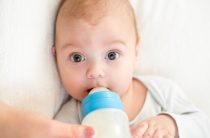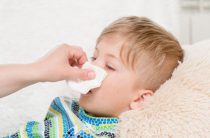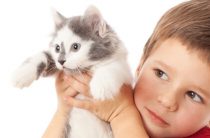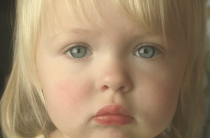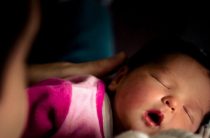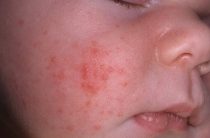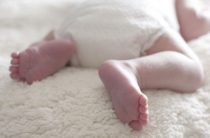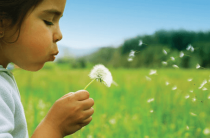Every conscientious parent knows that the health of the child must be carefully monitored from birth. Due to a weak immune system, children often develop various diseases. After all, immunity needs some time and special conditions to get stronger. Cough is very common among children. Many coughs in children are correlated with colds. But, in most cases, this symptom indicates the presence of an allergy. It is an allergic cough in a child that manifests itself in the first place. And if treatment is not started in a timely manner, the allergy will begin to progress and become chronic.
Symptoms of an allergic cough in a child
It is very difficult to distinguish an allergic cough in children from a sign of acute respiratory infections. But, nevertheless, there are some features and symptoms that will help to recognize the cause of the disease. The first feature is the onset of coughing without accompaniment of elevated body temperature. In general, the baby feels fine.
After a while, the symptoms get worse. There is a general lethargy of the body, the child becomes irritable and restless. Sleep mode is disturbed. Allergic cough in children is accompanied by a runny nose and bouts of sneezing. The symptoms and features of a cough caused by an allergy are as follows:
- The cough is barking;
- Occurs unexpectedly and attacks;
- Mostly dry;
- Lasts more than two weeks;
- Attacks occur mainly at night.
Symptoms are accompanied by severe itching in the nasal cavity and throat. The larynx is severely irritated. The trachea suffers greatly from coughing. From frequent spasms, the child's muscle corset begins to hurt.
Causes of allergic cough in children
The first symptoms of an allergy, namely a cough, often occur against the background of hay fever. Simply put, it is an allergy to the pollen of flowering plants. The disease manifests itself in spring and summer, with the first flowering of trees. Symptoms may be exacerbated by a rash on the body, itching and burning, conjunctivitis and allergic rhinitis. The child's cough is aggravated when walking outdoors near plants. It is important to recognize the problem in a timely manner and begin treatment.
No less rarely, an allergic cough in a child occurs against the background of exposure to pet hair on the mucous membranes of the body. I would like to clarify that allergies do not occur on the cat's fur itself. In the body of a pet, a certain protein is produced, which is distributed with the saliva and urine of the animal. Thus, the pathogenic component settles on wool, clothes, dishes, carpets, and furniture. It is he who, when inhaled, causes irritation of the throat, which leads to an allergic cough. And even modern hairless breeds of cats will not save your child from illness. You can recognize this type of allergy by observing the baby's body in the company with and without an animal.
Often children have a cough against the background of the presence of household dust. Due to the frequent stay in dusty rooms, allergies develop. At the same time, a cough will also appear from a long accumulation of dust in household items (pillows, sofas, beds). In its composition, dust is nothing more than a collection of dead skin cells, hair, microscopic mites, wool, food debris, and dirt. When this is inhaled, allergic rhinitis occurs, and then a cough. The peanut suffers first of all, since the body of a small person has not yet developed all its protective functions. It is important to monitor the room and bedding of the baby, and choose the right toys. Dust accumulates over the years in such things:
- Home library;
- Thick curtains and curtains;
- Carpets;
- Cushioned furniture;
- Small interior items;
- Stuffed Toys.
A child may suffer from an allergic cough due to intolerance to certain foods. It is in childhood that food allergies occur. Over time, at an older age, the problem goes away. From eating certain foods, the child develops a cough. If left untreated, angioedema may develop, leading to an increase in the size of the larynx, throat, tongue, or palate. Because of this, oxygen does not enter the lungs and the baby runs the risk of suffocation. It is necessary to completely exclude the allergen product and all its other variations (additives, essential oils, creams, etc.) from use. Foods that put your child at risk may include:
- Citrus fruits, strawberries, raspberries;
- Cow's milk, chicken eggs;
- Sweets and pastries;
- Food additives, seasonings and spices;
- Fatty meats;
- Tomatoes, beets, carrots;
- All types of nuts.
Cough is provoked by various medicines. These include most antibiotics, hormonal drugs. Herbal remedies also cause allergic cough attacks in babies. Molds inhaled by the child can also be the cause.
Allergic cough treatment methods
First of all, the treatment of this type of cough is aimed at eliminating the body's sensitivity to the allergen. For this, antihistamines are used in medicine. All of them block the production of histamine. Three generations of antihistamines have been developed. The first includes those that have a number of contraindications and possible adverse reactions. Due to their rapid excretion from the body, it is required to take such drugs much more often than others.
The third generation, on the contrary, has a minimal list of side effects. They stay in the body for a long time, so their effect lasts throughout the day. Among all antihistamines against allergic cough, the following are noted:
| Zyrtec | The drug belongs to the latest generation. Treatment with Zyrtec does not cause any adverse reactions. Relieves attacks of allergic cough, rhinitis, urticaria, Quincke's edema. You can treat with Zirtek tablets from the age of six, drops - from two months. |
| Tavegil | The child can be used from one year. The drug effectively fights any allergy symptoms. May cause dizziness and nausea. |
| Pipolfen | Allergy manifestations in children can be treated with tablets or injections for intramuscular administration of this drug. In the form of tablets, a child is allowed to take no earlier than the age of six. Injections are used from two months. |
| Diprazine | Treatment of a child with this drug can be started from the age of two months. The remedy relieves allergic cough, conjunctivitis, rhinitis, urticaria. |
| Suprastin | An effective remedy, their treatment is aimed at relieving allergy symptoms: runny nose, wheezing in the throat, redness of the eyes and skin, Quincke's edema. Children can be taken from infancy. |
The most effective treatment for allergic cough is achieved through immunotherapy. Treatment involves the systematic administration of a small dose of a diluted allergen. Thus, the child's body gradually gets used to the influence of the pathogenic component. The immune system begins to react properly and produce antibodies to the allergen. The disadvantages of the method include the duration in time (about 1.5 years). Also, injections are carried out only under the supervision of a doctor, and several times a week the child needs to be taken to the clinic.
To treat a cough in a child and relieve the frequency of attacks, it is required to use expectorants in the form of tablets and syrups. Almost all syrups are allowed for use by infants. Alteyka is such an effective remedy for children. Produced in the form of syrup. Consumed after meals. Treatment with this remedy lasts for two weeks.
Thermopsol is considered a strong expectorant. The product is made on the basis of medicinal herbs. Tablets are prescribed for severe attacks of allergic cough and bronchial asthma. The course of treatment for children is no more than five days. You can use various herbal preparations that are sold in every pharmacy.
Prevention of allergic cough
For the prevention of allergic cough in a child, parents need to do hard work. First, you need to make sure that your baby is eating. It is very important to carry out daily wet cleaning in a residential area. It would be better to get rid of items such as carpets, thick curtains, soft toys. The ideal flooring would be just linoleum or laminate. You can lay loose paths for the floor.
The biggest dust collector are soft toys. Very often they do not undergo any processing. Young children often put everything in their mouths. Toys should be such that it is possible to wash them every day under running water. Experts recommend using humidifiers in the presence of a child at home.
If hay fever is the cause of an allergic cough in a child, try to go out less in the spring and summer. Walks should be done in the evening, or after rain. Do not walk with your child near flowering plants. Be sure to wash your child thoroughly after going outside. It is also worth clearing the nasal cavity and gargling. When you get home, change your baby into new, clean clothes for the house. Following all the rules, you will be able to save the baby and not treat him with multiple medications.
